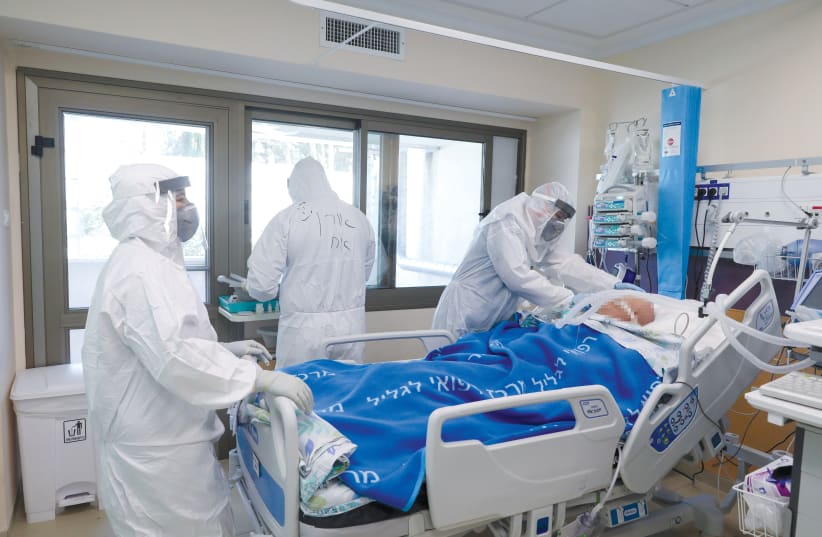A college student, age 19, was rushed to the hospital as his medical condition deteriorated at an alarming rate. The doctors acted under intense pressure to figure out the mysterious cause of his illness and save his life. But the only clue they had was that just before he started to feel sick, he ate some Chinese food that contained chicken and noodles, leftover from the previous night.
Soon the doctors found that this fateful snack led to severe food poisoning, which in an unfortunate coincidence with some other medical conditions, left the young man a step away from death, struggling for his life for nearly a month.
A description of this unusual case was published a year ago in the New England Journal of Medicine and was recently widely promoted on a YouTube channel run by an assistant clinical lecturer at the University of Illinois.
A story that begins with leftover chicken
This student, like many students, put together foods from several boxes in the fridge to reheat and eat. Shortly afterward, he began vomiting reddish-brown fluid and suffering from severe abdominal pain. Soon, his condition deteriorated and more symptoms appeared: chills, chest pain and shortness of breath. Then he noticed that he was having difficulty moving his neck, his muscles became stiff and his vision was blurred.
Five hours before he went to the hospital, purple spots appeared under his skin. They looked like bruises or dry blows but no damage was done that could have caused them. His friend started to worry and decided to take him to the ER. On the way there the student was in severe pain and couldn’t move his head.
In the ER, his blood pressure was very high and his pulse was 147 beats per minute. He gasped and breathed at a rate 1.5 times faster than usual. Despite his panting and the great exertion of his heart, he was still in hypoxemia (lack of oxygen in the blood).
The doctors attached him to an oxygen mask, but even that didn’t help much. They also immediately gave him a broad-spectrum antibiotic, in an attempt to cut off a bacterial infection that may have started to develop, but the young man's condition continued to deteriorate and his blood pressure also dropped.
At this point, more purple spots appeared under his skin, mostly in his limbs, and his vital organs began to collapse one by one. Two hours after he arrived at the emergency room he was flown by helicopter to Massachusetts General Hospital, which had the resources to treat him.
System crash
When he got to the intensive care unit his blood pressure was already extremely low, his heart rate climbed further to 166 and his body temp was close to 41°C (106°F). He was anesthetized, but a pupil test confirmed that his brain still functioned. The spots under the skin on his hands and feet were very dark and diffuse. A test showed that his body had stopped producing urine, indicating renal failure.
The doctors were divided as to the diagnosis of his condition. At this age, the risk of sepsis was low but all signs indicated a systemic inflammatory response, as well as coagulation problems which caused the dark hemorrhages under the skin.
Meanwhile, doctors discovered that the young man was suffering from thrombocytopenia - a condition in which platelet levels are lower than normal (platelets are a clotting factor). Usually, however, when this happens, the damaged platelets are eliminated through urine. But the patient didn’t produce urine at all, which showed that damaged platelets were probably still circulating in his body.
Seeing the range of symptoms, doctors decided to diagnose a potentially fatal condition in which blood clots in small lumps in all sorts of places in the body and blocks small-medium blood vessels. In response to these blockages, the large blood vessels dilate to increase the impaired blood flow, blood pressure drops and organs begin to collapse one after another due to lack of oxygen supply. At the same time, the tissues at the tips of the limbs (fingers and toes) began to rot and die.
Microbiological tests performed on blood samples taken from the patient confirmed the doctors' diagnosis and detected the presence of a meningococcal bacterium. The infection created by the bacterium caused multiple and diffuse blood clots in the student's body, his organs collapsed and his body went into a state of shock. A day after eating the takeout he suffered a multi-system failure that included his heart, kidneys and lungs.
The damage was done
Now that the doctors knew exactly what bacterium started this horrible snowball, they could treat it with a targeted antibiotic, which is known to be effective against meningococcal bacteria. But most of the damage was permanent. Due to the necrosis in his limbs, both his legs below the knee were amputated, as well as parts of all his fingers. The young man remained hospitalized in intensive care for another 26 days, and then was transferred for further treatment and rehabilitation in a regular ward.
How did the meningococcal bacteria enter his body – and how did a young man without a background of clotting problems suddenly develop a severe medical condition of multiple blood clots at such dizzying speed?
Here is what doctors discovered. The young man's partner also ate from the leftovers of Chinese food. He vomited immediately afterward, but instead of throwing the boxes in the trash, he put them back in the fridge, probably not to waste money.
The difference between the unfortunate student and his (stupid) partner is that unlike the partner, he hadn’t received a booster against the meningococcal bacterium, a vaccine usually given to students who live in dorms, where meningitis can quickly spread. The partner received his boosters on time, while the ill-fated student missed his last two doses. And this is probably what turned what could have ended in vomiting and aversion to Chinese food for a while, into a medical emergency that almost ended his life.
This severe case is an unusual, extreme warning sign regarding the dangers of food poisoning. Don’t avoid eating leftovers altogether, but exercise discretion – and don’t skip routine immunizations.

